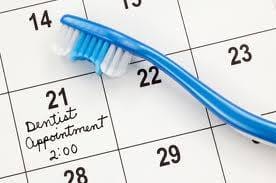 Do you view brushing your teeth as a mindless task? It may be time to rethink the “mindless” strategy behind caring for those pearly whites. Not thinking about brushing your teeth can lead to common brushing mistakes—and some pretty significant ones that can impact your oral health. And since oral health is connected to your overall health, that means even more is on the line every time you brush. So next time you brush, think about it: are you making these common brushing mistakes?
Do you view brushing your teeth as a mindless task? It may be time to rethink the “mindless” strategy behind caring for those pearly whites. Not thinking about brushing your teeth can lead to common brushing mistakes—and some pretty significant ones that can impact your oral health. And since oral health is connected to your overall health, that means even more is on the line every time you brush. So next time you brush, think about it: are you making these common brushing mistakes?
- Buying the wrong brush. Are you throwing your jaw out of place trying to get that brush into the corners of your mouth? Are your gums raw and bleeding after every brushing? You may be buying a brush that is too big and brushing with bristles that are too hard. Dentists recommend buying a soft or medium brush, which is easy on the gums while still getting your teeth clean.
- Not brushing long enough. The American Dental Association recommends brushing for 2 minutes. Are you brushing long enough? Use a timer, or find another way to make sure you are hitting the 2 minute mark every time you brush.
- Not flossing. We know that technically this has nothing to with your toothbrush, but flossing is an important part of your brushing routine that many people miss. Flossing is essential for removing harmful bacteria between your teeth, so not including this as part of your daily brushing routine can negatively affect your oral health.
- Brushing incorrectly. Do you start brushing on the same side every time? If you haven’t thought about it before, it’s time to start taking note. Commonly, people brush harder when they start, so it’s important to spread that effort around your mouth. Once you’ve figured out which side you start on, alternate sides and make sure you’re brushing correctly and teaching your kids to do the same. Ask your dentist to demonstrate the correct way to brush your teeth.
- Brushing too much or too hard. Consistency is the key to a healthy mouth. Maintain a daily consistent brushing schedule of 2-3 times a day, and not any more than that. Brushing too much can damage your tooth enamel, which can lead to other tooth problems. Also, don’t brush too hard which can have the same negative effect on your teeth.
- Holding on to that nasty old toothbrush, with an emphasis on “old.” Your toothbrush should be replaced every 3-4 months or earlier if the bristles fray.
- Not rinsing the brush. When you’ve completed two minutes of brushing, rinse the brush to wash the toothpaste and bacteria out. Make sure you don’t put your rinsed toothbrush in a tight container after you’re done. Let your toothbrush air dry.
If you have any questions, make a list to take to your next dentist appointment, send your dentist a message or contact them via social media. Spending a few minutes thinking about your brushing routine can make a world of difference at your next dentist appointment when you walk in and out with a clean, healthy mouth.





